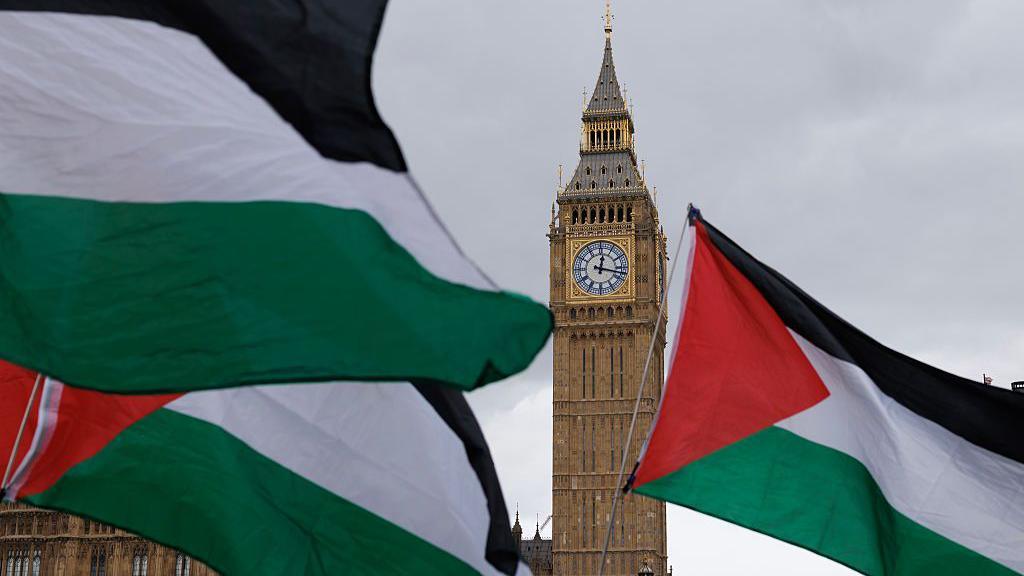As Sir Keir Starmer delivered his address from within Number 10, the scene outside on Downing Street was one of intense activity and noise.
Protesters advocating for Gaza made their presence known with a cacophony of drums, sirens, and whistles.
This demonstration served as a stark visual representation of the mounting public pressure on the Prime Minister to adopt a firmer stance regarding Israel.
Beyond public sentiment, political pressures are also at play.
A significant portion of Labour’s backbench MPs, over half, have signed a letter urging the government to recognize a Palestinian state.
Furthermore, several cabinet ministers have reportedly engaged in behind-the-scenes lobbying on this issue.
Recent weeks have seen a discernible shift in the government’s rhetoric, culminating today in a more definitive articulation of its position.
It is important to recognize this as a significant potential shift in British foreign policy.
While Labour has historically supported recognizing a Palestinian state as part of a peace process and at a moment of maximum leverage, Sir Keir appears to believe that moment is now.
However, critical caveats remain. The Prime Minister stated that the UK would recognize a Palestinian state in September, contingent on the Israeli government taking “substantive steps to end the appalling situation in Gaza.”
Specific demands were outlined for Israel:
Demands were also placed on Hamas:
The feasibility of these preconditions remains a point of contention.
Given the current composition of the Israeli government, which relies on support from far-right factions opposed to a two-state solution, the likelihood of Israel agreeing to these conditions appears slim.
Sources indicate that Sir Keir spoke with Israeli Prime Minister Benjamin Netanyahu prior to the cabinet meeting this afternoon.
Whether Hamas would willingly disarm and relinquish any role in Gaza’s governance is also highly doubtful.
These conditions have already drawn criticism, including from within Labour ranks, such as Sarah Champion, a prominent advocate for this policy shift.
Champion expressed concern that “our recognition appears conditional on Israel’s actions.”
She further emphasized that “Israel is the occupier, and recognition is about the self-determination of the Palestinian people.”
The Conservatives have dismissed the move as merely “designed to appease his backbenchers” and argue that it “will not secure lasting peace.”
Therefore, the question arises: will the government proceed with recognizing a Palestinian state if only some of these conditions are met?
For instance, what if a ceasefire is achieved but progress towards a two-state solution remains limited?
Senior government figures have indicated that this decision will be made in September.
However, with the prospect of British recognition of a Palestinian state now a tangible possibility, it may prove challenging for the government to reverse course, especially given the significant support for such a move within the Labour party.
Why now? And will this decision have a meaningful impact on the situation in Gaza?
Sir Keir cites the dire humanitarian crisis in Gaza as a contributing factor.
Additionally, he expressed “particular concern that the idea of a two-state solution is reducing and feels further away today than it has for many years.”
The central question remains: will this initiative amount to more than a symbolic gesture?
The Prime Minister aims to avoid that outcome.
The conditions are intended to exert pressure on Israel to alter its course.
However, the US wields considerably more influence over Israel, and its long-standing policy is to only recognize a Palestinian state as part of a broader resolution to the conflict.
Donald Trump has previously suggested that doing so now would “reward Hamas.”
Sir Keir seeks to demonstrate his credibility as a leader capable of making a real impact on the global stage.
The realization of this ambition now rests, to a significant extent, in the hands of Netanyahu and Trump.
Sign up for our Politics Essential newsletter to keep up with the inner workings of Westminster and beyond.
The BBC’s diplomatic correspondent Paul Adams explains how the people of Gaza have reached a point of starvation.
At least 112 people were killed in the 24 hours before late Tuesday morning, 22 while trying to get aid, the ministry says.
PM Sir Keir Starmer has said the UK will recognise a Palestinian state in September unless Israel takes “substantive steps to end the appalling situation in Gaza”.
Yasmeen Abu Sultan says her two-month old daughter is suffering from malnutrition and asked that she is taken out of Gaza to undertake medical treatment.
Donald Trump and John Swinney met ahead of the president’s new golf course opening in Aberdeenshire.

